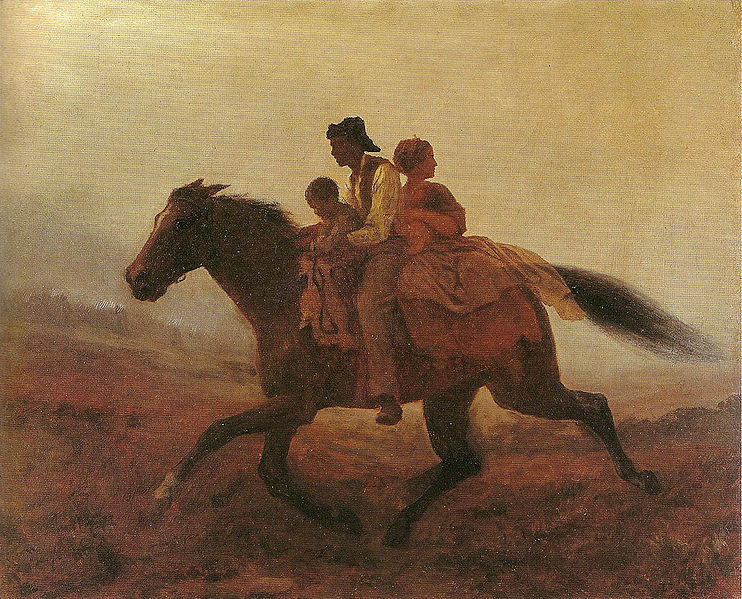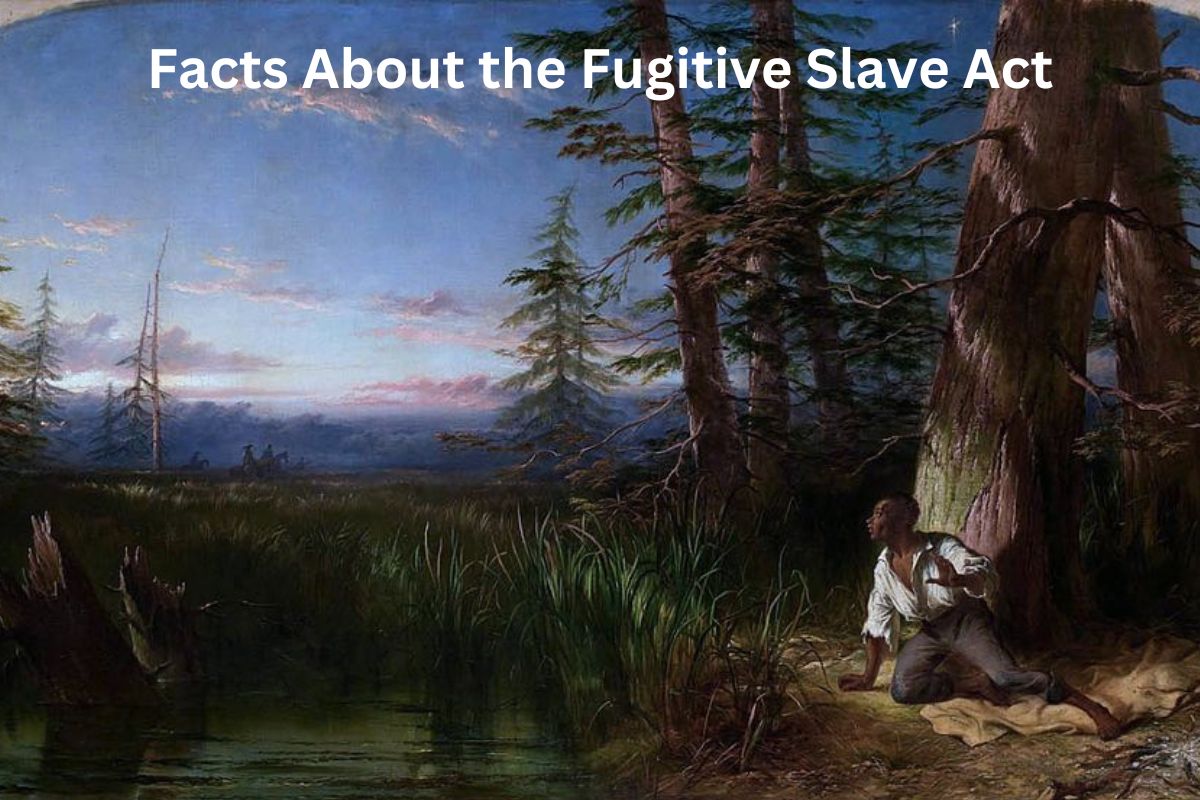The Fugitive Slave Act of 1850 was a pivotal piece of legislation passed as part of the Compromise of 1850. The Act aimed to strengthen the institution of slavery by providing mechanisms to capture and return escaped slaves to their owners.
It denied fugitive slaves the right to a jury trial, imposed penalties on those who assisted them, and empowered federal officials to deputize individuals to aid in their capture.
The Act provoked widespread opposition and resistance in the Northern states, further deepening the divide over the issue of slavery and contributing to the tensions that eventually led to the American Civil War.
Fugitive Slave Act Facts
1. The Fugitive Slave Act of 1850 was a law passed by the United States Congress on September 18, 1850
The Fugitive Slave Act of 1850 was a key component of the Compromise of 1850, a series of legislative measures intended to maintain the balance between free and slave states.
The Compromise aimed to appease both Northern and Southern interests by addressing issues such as the expansion of slavery into new territories. The Fugitive Slave Act was one of the most controversial provisions of this compromise.
2. The Act required citizens and law enforcement officials of free states to cooperate in the capture and return of runaway slaves
The Act was intended to bolster the power of slaveholders by providing them with legal mechanisms to recapture escaped slaves who had made their way to free states.
It aimed to address the growing problem of runaway slaves by strengthening the legal authority of slaveholders and federal officials. The Act was fiercely advocated by Southern politicians who saw it as essential to protect their property rights.

3. Under the Fugitive Slave Act, slaveholders or their agents could present evidence to a federal commissioner, who would determine the status of the alleged fugitive
Under the Fugitive Slave Act, federal commissioners were appointed to oversee the process of capturing and returning escaped slaves. These commissioners were responsible for deciding the fate of alleged fugitives based on the evidence presented by slaveholders or their agents.
The commissioners were not required to hold a formal trial or provide the accused with the right to testify or present evidence in their defense.
This lack of due process raised significant concerns among abolitionists and opponents of slavery in the free states. It effectively denied fugitive slaves the basic rights protected by the U.S. Constitution.
4. The Act denied fugitive slaves the right to a jury trial, effectively circumventing the protections of due process guaranteed by the U.S. Constitution
The denial of a jury trial under the Fugitive Slave Act was a significant departure from the legal protections afforded by the U.S. Constitution. The right to a jury trial was seen as a fundamental safeguard against arbitrary decisions and a means to ensure fairness and impartiality.
By bypassing this right, the Act undermined the principles of due process and created an environment where individuals accused of being fugitive slaves had limited legal recourse or opportunities to defend themselves.
5. The Act required all citizens, including Northern abolitionists, to assist in the capture of escaped slaves
The provision in the Fugitive Slave Act that compelled citizens, including Northern abolitionists, to assist in the capture of escaped slaves generated widespread outrage and resistance in free states.
Many people in the North opposed slavery and saw the Act as an infringement on their personal liberties and moral convictions. They viewed it as forcing them to participate in the perpetuation of an unjust and inhumane institution.
As a result, there was widespread non-compliance with the Act, with many people actively opposing its enforcement and aiding fugitive slaves in their escape or hiding.
6. The Act empowered federal marshals to deputize individuals to aid in the capture of fugitive slaves
The Fugitive Slave Act empowered federal marshals to deputize individuals to aid in the capture of fugitive slaves. This provision effectively deputized slave catchers, who were often bounty hunters or agents employed by slaveholders.
These individuals had broad powers to search for, apprehend, and return alleged fugitives. The Act provided them with legal authority and protection to operate in free states, even if their actions violated the rights of free African Americans.
This led to numerous cases of mistaken identity, with free individuals being wrongfully captured and enslaved, as slave catchers prioritized capturing as many individuals as possible to collect rewards.
The actions of these deputized individuals contributed to the climate of fear and suspicion that pervaded free states during this period.
7. The Act also made it illegal to harbor or conceal fugitive slaves
The provision in the Fugitive Slave Act that made it illegal to harbor or conceal fugitive slaves had a chilling effect on free African American communities and anti-slavery activists. It put them at risk of being charged, fined, or imprisoned for providing aid, shelter, or assistance to escaped slaves.
Despite the risks, many free African Americans and sympathetic white individuals continued to provide support to fugitives, establishing networks and safe houses commonly known as the Underground Railroad. These networks helped thousands of slaves escape to Canada or other free areas.
8. The enforcement of the Fugitive Slave Act was met with widespread resistance in many Northern states
The enforcement of the Fugitive Slave Act faced significant resistance in many Northern states. In response to the Act, several state legislatures passed “personal liberty laws” that aimed to protect the rights of free African Americans and hinder the implementation of the Act.
These laws granted accused fugitives the right to a jury trial, provided legal counsel, and made it more difficult for federal authorities to seize alleged fugitives.
Personal liberty laws were a form of nullification, as they sought to nullify or render ineffective the federal law within the boundaries of those states.
This resistance added to the growing tension between Northern and Southern states and highlighted the stark divide over the issue of slavery.
9. The Act’s enforcement further inflamed tensions between the North and South
The Fugitive Slave Act became a rallying point for abolitionists and anti-slavery activists, further galvanizing their opposition to the institution of slavery. The Act’s oppressive nature and denial of basic rights stirred outrage and a sense of injustice among many Northern citizens.
It prompted a wave of activism, including protests, public meetings, and the publication of anti-slavery literature. Prominent abolitionists like Frederick Douglass and Harriet Tubman became even more dedicated to their cause, actively assisting fugitive slaves and speaking out against the Act’s injustices.
10. The Fugitive Slave Act of 1850 remained in effect until the end of the American Civil War in 1865
Ultimately, the Fugitive Slave Act of 1850 remained in effect until the end of the American Civil War in 1865. The Act’s enforcement contributed to the deepening divide between the North and South, exacerbating tensions over slavery that eventually erupted into armed conflict.
The Thirteenth Amendment to the United States Constitution, ratified after the Civil War, abolished slavery and rendered the Act obsolete. The Act’s legacy, however, is a testament to the deeply entrenched divisions over slavery and the lengths to which some were willing to go to protect the institution, as well as the determination and resistance of those who fought against it.
